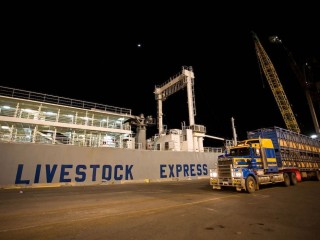 The Federal Government has imposed an immediate suspension on all live cattle exports to Indonesia.
The Federal Government has imposed an immediate suspension on all live cattle exports to Indonesia.
The Prime Minister Julia Gillard announced the suspension last night after meeting with live cattle industry leaders and officials in Darwin.
Ms Gillard told the media the suspension would not be lifted until the Federal Government was satisfied that cattle sent to the market can be treated to international standards. News Limited papers have speculated that the suspension will last for 10 days, however Ms Gillard did not attach a time-frame to her comments last night.
Further details will be released when Minister for Agriculture, Fisheries and Forestry, Joe Ludwig, holds a press conference in Brisbane at 10am to discuss the issue today.
The decision follows a week of public outrage over video evidence of Australian cattle being subjected to cruelty and mistreatment in Indonesian abattoirs.
The announcement is a victory for Animals Australia which secured the initial footage that sparked the Four Corners investigation, but the group says it is still not satisfied with the temporary suspension.
“Only a complete ban on the live animal exports to all countries will ensure that these images are not repeated, and also ensure that Australia sends the strongest possible message to other countries that animals, and their welfare matters.”
The suspension will at least temporarily stop the supply of imported cattle to Indonesia in the midst of its peak period of demand for cattle in the approach to the Ramadan Muslim religious festival in August.
Indonesian Meat Producers and Feedlot Association (Apfindo) executive director Joni Liano told the Jakarta Post earlier this week that a ban on to feedlots in Indonesia would leave the country “bereft of beef”.
“Local cattle will be depleted,” Joni Liano said.
Abattoirs would be forced to slaughter cattle before they could reach the ideal weight of 450 kilograms, he said.
However Indonesia’s Agriculture Minister Suswono said the country would import cattle from other countries if a ban by Australia was imposed.
“We are not concerned with the threat of Australia to stop its cow exports to Indonesia because we can import the cattle from other countries,” Suswono told state news agency Antara.
Speaking earlier, WA LIberal Senator Chris Back said if Australia exited the live cattle trade to Indonesia, it would simply be replaced with cattle and buffalo from other sources, like India.
Senator Back, a veterinarian by profession, said India was a country rife with Foot and Mouth Disease. If FMD got into Indonesia (currently FMD-free) it could get into Australia very quickly, he said.
"For people who are concerned about the death and destruction of animals, once we get FMD into this country, the destruction of animals whilst we try to eradicate the disease would be massive," he said.
Townsville based livestock agent Tim McHugh, Hogan and McHugh, said a prolonged suspension would have a negative impact on all Australian cattle prices.
“There wouldn’t be a grazier in Australia from the tip of Cape York to Tasmania that wasn’t impacted by the weight limits enforced (by Indonesia) last year, because thousands, hundreds of thousands of mainly cows and bulls that would normally have gone to Indonesia were put back on the market here in Australia and kept the lid on the market.”
He said the live export market played a vital role in helping northern producers to sell cattle, particularly in dry years.
“In an average year, if we average it over the past 40 to 50 years, we haven’t got the capcity for say 50 percent of the time to fatten those cattle.
"The drought years are going to come back and the meatworks can’t kill store cattle. There is no point killing store cattle for meat and bone.
"I think back to the drought early 1990s, if it hadn’t been for live exports we would have had a terrible situation.
“We had no domestic demand for store cattle whatsoever, and fortunately we had live exports and that is where they went."
